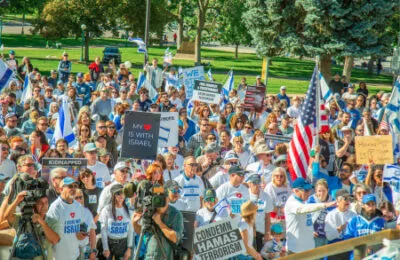While we’re lighting Chanukah candles in the comfort of our homes, children are being slaughtered in Syria. Even though Syria is Israel’s enemy, even though Syria has repeatedly tried to destroy Israel, we feel for the innocent Syrian victims of genocide.
That is what the war in Syria has become: genocide. If the following does not qualify for that supreme expression of evil, what does?
Since March, 2011, when the conflict began in Syria as a civil war, some 450,000 Syrians have been killed, including 15,000 children. Some two million more have been injured. There are 11 million Syrian refugees globally, more than 50% of Syria’s entire population: 4.8 million in Turkey, Lebanon, Jordan, Egypt and Iraq, and 6.6 million internally displaced within Syria.
Lest “internally displaced” sound like not such a big deal, keep in mind that the perpetrators of these crimes — Russia, the Syrian government, Iran, ISIS and various other terrorists — have deliberately bombed hospitals and homes.
“We cannot ignore what goes on at such a small distance from Israel,” Sarah Haetzni Cohen, initiator of the hashtag #Israel4Aleppo, told Tazpit Press Service. “But while we are sitting here drinking coffee, children are being massacred.”
Why does Cohen care? Why should she care? Because she’s Jewish. Because there is a Torah. Because there was a Holocaust. Because “good people” sat silent during the Holocaust.
“My father, a Holocaust survivor, used to tell me about the hurtful silence of Pope Pius XII,” said Gadi Gvaryahu, chairman of Tag Meir, an organization that formed a human chain from the American embassy in Tel Aviv to the Russian embassy down the street in order to call for action to end the slaughter in Syria.
“The slaughter of the Syrian people must be stopped and we, in Israel, need to lend a hand, beyond all the good initiatives already being undertaken. We simply need to do more.”
One of the good initiatives already undertaken is that of Moti Kahana, whose organization Amalia brings Syrian women and children into Israel for medical treatment and humanitarian aid.
Israel Interior Minister Aryeh Deri, no friend of religiously liberal American Jews, nonetheless is on the same page as they and so many other Jews with reference to Syria. Deri urged Israel’s Prime Minister Benjamin Netanyahu to seek a UN Security Council meeting to discuss Aleppo.
Only decisions on the level of the Security Council, or on the level of the highest echelons of the warring parties and other governments, can truly turn the tide. The truth is, as important as all of the humanitarian efforts are, they do not begin to address the dimensions of the tragedy. Only world powers, particularly those with both the conscience and the power to make a difference, can shut down this genocide.
Russia and the Syrian government have the power, but not the conscience. Perhaps, the United States government has the conscience, but it acts as if it does not have the power. Perhaps the European Union has neither. The Security Council is subject to the veto of Russia.
Particularly pathetic, though certainly not as evil as Syria and Russia, is the specter of the American ambassador to the UN, Samantha Powers. She cried out last week in an impassioned speech to Russia, Iran and Syria for the Aleppo atrocities: “Is there literally nothing that can shame you?” she asked. We would say to Samantha Powers, recalling Elie Wiesel’s stricture that the pain caused by the bystander approaches that which is caused by the perpetrator: “Is there literally nothing can shame you, Ms. Powers, for representing a government that does virtually nothing to stop the evil of Russia, Iran and Syria — for confining yourself to impotent speeches?”
Yet, if non-bystanders, if activist humanitarians on the ground and good people everywhere, do not continue to demand of powerful governments broad-based action, this genocide will surely continue. We have no choice but to stand up to it. “Within this fight we are also perpetuating the memory of our own history,” says Gadi Gvaryahu. “We have recently known what it means to be a refugee and have known the definition of massacre.”
There is still a tighter, more tailored Jewish connection to the cruelties in Syria, particularly in Aleppo. The progenitors of some 75,000 Syrian Jewish Americans know the topography and the culture of the genocided land. Poopa Dweck of Deal, New Jersey, has never been to Aleppo, yet still calls it her “homeland.”
Dweck, author of the Syrian Jewish cookbook, Aromas of Aleppo, was born after her parents escaped Syria in 1947. Like the vast majority of Syrian Jewish Americans, she deeply honors the Jewish traditions — not least, the culinary traditions — that her family brought with them. “We’re devastated for the homeland itself because that’s where we come from. We don’t want to see it destroyed,” Dweck recently told JTA.
Locally, JEWISHcolorado has joined a nationwide Jewish Aleppo fund, a partnership of the national federation system, the Joint Distribution Committee and the Jewish Coalition for Disaster Relief.
Needless to say, it may be easier to collect the funds than to distribute the aid. Evil people do their best to put a stop to humanitarian evacuations and to the distribution of food and medicines.
Clearly, however, the people on the ground know when to go in and when not to. They have delivered food, medicine and clean water to Syrian refugees since 2013. We have no choice but to step up and enable their sacred work to continue.
Copyright © 2016 by the Intermountain Jewish News















